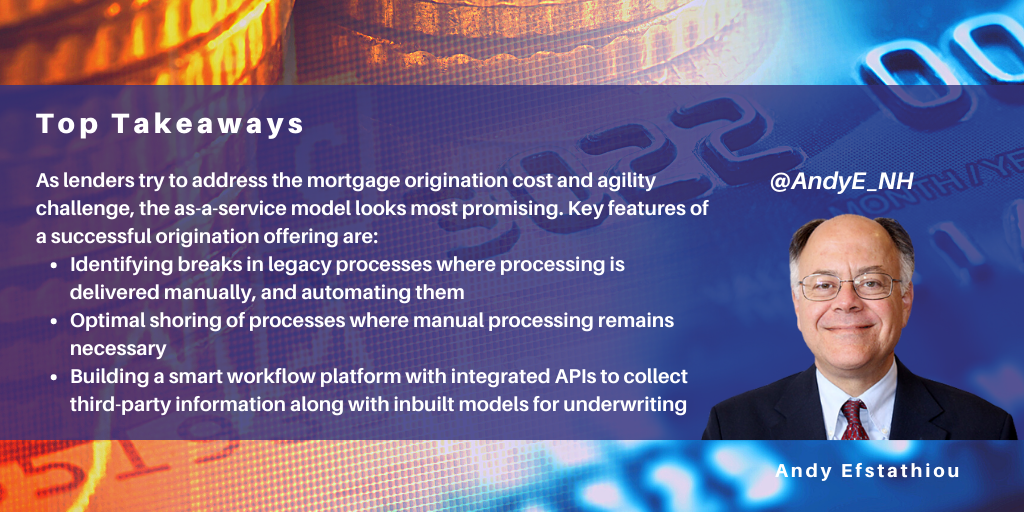Search posts by keywords:
Filter posts by author:
Related Reports
Related NEAT Reports
Other blog posts
posted on May 09, 2023 by Andy Efstathiou

The lending business is highly cyclical due to its sensitivity to interest rates, economic cycles, and capital availability to fund loans. According to the Mortgage Bankers Association, these factors are currently driving down mortgage originations, which have fallen 60% y/y in the U.S. in Q4 2022.
The decline in originations pressuring the margins of this high-cost activity is the leading change in the industry. Delinquencies, while currently low, are expected to grow rapidly over the next year as the economy slides into an anticipated recession. Banks need to increase their agility to deal with these volume shifts cost-effectively. There are two key levers to address the shift in processing volumes:
- Automation, which enables an absolute reduction in OPEX based on upfront investment
- Outsourcing, with committed volume flexibility, enables the matching of revenues and costs.
Of the two, the more compelling savings can be made from automation, as long as transaction volumes across the entire business cycle can justify the initial investment. Mortgage origination is a clear first choice for automation because:
- The cost of mortgage origination in the U.S. is typically 10x the cost of servicing ($5k to $10k per loan in the U.S. depending on product complexity and lender platform maturity)
- Origination remains mostly a manual process. Most Loan Origination Solution (LOS) platforms in the market are providing only partial STP processing, relying mostly on manual sub-processes
- Originations are highly cyclical.
Lenders and services vendors are trying to address the mortgage origination challenge, and while no single model has won the market, the as-a-service model looks most promising.
WNS has developed a mortgage-as-a-service (MaaS) offering, working with mortgage lenders for years, and has identified many typical breaks in legacy processes where processing is manually delivered. Critical to the success of a MaaS offering is bringing the most effective resources to bear at each step of the process. The choices include:
- Intelligent Automation of manual processes, where possible
- Optimal shoring of processes, where manual processing remains necessary
- Flexibility for clients to opt for unit-based pricing model
The key steps in the origination process where MaaS transforms processing are:
- Pre-processing and sending initial loan estimate: after receiving the application, the MaaS delivers an initial loan estimate within three days. All offshore delivery
- Third-party orders: auto-triggered order checks including flood, credit, verification of employment, verification of deposit, title, mortgage insurance, appraisal, fraud, etc. All offshore delivery
- Document validation: documents have data extracted and are converted to a digital loan file. Exceptions are handled manually. All offshore delivery
- Conditions management: decision engine and underwriting, automatically raising conditions for consideration by loan officers. Combined onshore/offshore delivery
- Document reviews: review and analysis of income, collateral, asset, title, Agreement of Sale, and fraud. Combined onshore/offshore delivery
- Approval: onshore lender works with the offshore team to approve the loan package. Combined onshore/offshore delivery
- Loan closing: LE and CD prep of documents; schedule closing with the title company. Combined onshore/offshore delivery
- Transfer to servicing: digital loan file transfer to servicing platform. All offshore delivery.
The backbone of the MaaS offering is a combination of
- Smart Workflow platform with integrated APIs to collect third-party information along with inbuilt models for underwriting
- Intelligent automation powered by RPA and Artificial Intelligence.
The MaaS service integrates with the client LOS platform and digital front end to deliver services to bank customers. Because the offering is modular, clients can buy point solutions to automate individual components of the origination process.
Technology is necessary, but not sufficient for successful transformation of the loan operations process. The human element is a critical component of the success of the MaaS offering. The MaaS offering incorporates the development and utilization of talent with a comprehensive understanding of the mortgage process, associated challenges, and parameters of compliance and non-compliance. Initial and ongoing training and examinations in end-to-end loan review including compliance measures are required to continually improve the quality of performance and service levels that complement the areas of automation.
WNS’ MaaS offering has been delivering lenders benefits including:
- Productivity gains of 3x from automation and global delivery
- Customer inquiries and complaints: 50% reduction
- Reduction in loan origination costs: 40%
- QA/QC processes eligible for automation: 70%
- Loan final closure in 15 to 20 days.
These benefits are especially compelling as origination volumes decline and a MaaS service connects costs to revenues, allowing for costs to decline as volumes plummet. We expect to see the industry produce more MaaS offerings as the economy continues to shift. Early vendors, such as WNS, will have more mature offerings as lenders shift to outsourced as-a-service operations models.
